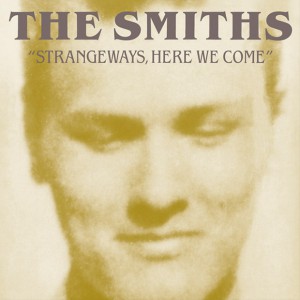 The Smiths were undoubtedly one of the most significant alternative rock bands to come out of England in the 1980s. Their fourth and final studio album Strangeways, Here We Come produced in the spring of 1987 is was a success. Following the release of The Queen is Dead in the summer of 1986, one of the greatest albums of the time, they could have come out with two thirty-minute tracks of Morrissey moaning and it would be big. Strangeways, Here We Come signifies the demise of the band, and shortly after its recording, Johnny Marr, the guitarist, exited the group, ultimately leading to the band’s separation. Although not having as much critical or commercial triumph as previous work, it still displays the talent that brought the band such high acclaim.
The Smiths were undoubtedly one of the most significant alternative rock bands to come out of England in the 1980s. Their fourth and final studio album Strangeways, Here We Come produced in the spring of 1987 is was a success. Following the release of The Queen is Dead in the summer of 1986, one of the greatest albums of the time, they could have come out with two thirty-minute tracks of Morrissey moaning and it would be big. Strangeways, Here We Come signifies the demise of the band, and shortly after its recording, Johnny Marr, the guitarist, exited the group, ultimately leading to the band’s separation. Although not having as much critical or commercial triumph as previous work, it still displays the talent that brought the band such high acclaim.
The depressed lyrics of the album illustrate the unswerving melancholy generated by the lead singer, Morrissey’s gloomy baritone voice. The entire LP even seems to playfully dance with death, in the self-loathing and angst driven nine song document of the decaying band. This sardonic waltz with the grim reaper is illustrated in “Girlfriend in A Coma,” where the morbid and dark words are accompanied with upbeat finger work from Marr’s guitar. The words “I know I know it’s/It’s really serious” are put forward with a cheerful jingle, that could fit right into a catchy holiday commercial, and will probably get stuck in your head (beware).
The pensive sorrow of this production is highlighted in “Last Night I Dreamt Somebody Loved Me,” where the name can pretty much depict the theme of loneliness and unrequited romance. With lines such as “And tell me how long / before the right one?” there is no doubt of Morrissey’s mourning as always. However, these slightly self-absorbed lyrics may come off as arrogant. Morrissey may have just stayed in adolescence his entire life, for all his pangs arise from typical teenage issues. The stereotypical teenage distress may be relatively petty, but is still relatable for some, and Morrissey’s voice is the quintessential tool to express it.
 The group’s final single, “Stop Me If You Think You’ve Heard This One Before” became one of the more contentious works of The Smiths. Due to the lyrics “plan a mass murder,” the song was banned from BBC daytime airplay. Despite having no correlation to actually murdering anyone and the band’s message being fabricated, it was banned. The lyrics stated “I crashed down on the crossbar and the pain was enough/To make a shy, bald, buddhist reflect/ and plan a mass murder. This was implying that Morrissey fell on the crossbar of bicycle, and the pain was enough to make someone who is typically assumed peaceful and against murder plan a mass murder, not that he wanted to kill anyone. “Stop Me If You Think You’ve Heard This One Before” stood out in the album, and has a sense of immediateness as it tells a monologue of avoided responsibility. The guitar’s accompaniment fits in almost perfectly; with neat riffs and a strong sense of purpose, it ties it all together and makes this a certain favorite.
The group’s final single, “Stop Me If You Think You’ve Heard This One Before” became one of the more contentious works of The Smiths. Due to the lyrics “plan a mass murder,” the song was banned from BBC daytime airplay. Despite having no correlation to actually murdering anyone and the band’s message being fabricated, it was banned. The lyrics stated “I crashed down on the crossbar and the pain was enough/To make a shy, bald, buddhist reflect/ and plan a mass murder. This was implying that Morrissey fell on the crossbar of bicycle, and the pain was enough to make someone who is typically assumed peaceful and against murder plan a mass murder, not that he wanted to kill anyone. “Stop Me If You Think You’ve Heard This One Before” stood out in the album, and has a sense of immediateness as it tells a monologue of avoided responsibility. The guitar’s accompaniment fits in almost perfectly; with neat riffs and a strong sense of purpose, it ties it all together and makes this a certain favorite.
One of the more politically driven Smith’s songs, “The Death of A Disco Dancer” showcases the talent of the entire band. With stanzas like “And if you think peace is a common goal/ Well, that goes to show how little you know,” the song takes cynical views, and makes them even more despairing and hopeless through Morrissey’s baritone. The ending leaves time to show instrumental ability from the band, and is a highlight on the non-vocal side.
The final song of the album “I Won’t Share You” is filled with aspiration and more dazzling downcast. Morrissey singing the words “Has the Perrier gone straight to my head/ Or is life plainly sick and cruel, instead?” show the forsaken narrative. However, this song comes with a glimpse of hope as he sings “The ambition and the zeal I feel/ This is my time.” This line was possibly foreshadowing his subsequent solo career, which came directly after.
Overall, this may not be the pinnacle of The Smith’s work, however, it is a clear demonstration of their skill. If you are looking for some cheerful, uplifting, feel good music, don’t even go near this album, or really anything by this band at all. However, for all those seeking asylum in depressing and relatable self pity, The Smiths are here to help.
